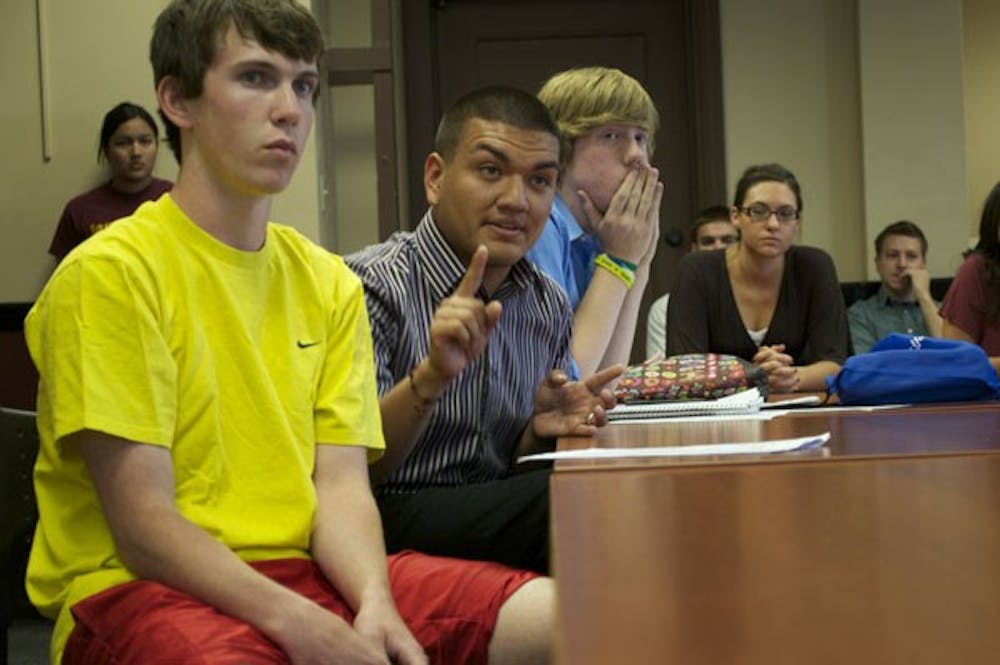What began as a formal presentation and discussion of election code complaints and violations quickly shifted to an emotionally-driven debate on how the Downtown Election Committee interpreted election laws during the student government presidential race.
Disqualified downtown candidate Andres Cano and his running mate Vaughn Hillyard, along with a group of supporters, attended Monday’s open meeting of the Downtown Election Committee, which was held to discuss the reasons behind Cano and Hillyard’s elimination from the race.
Cano and Hillyard, who won the election 454-321, were disqualified early Thursday for accumulating more than nine penalty points — points given to candidates because of election code violations.
According to the Downtown election code, receiving nine points results in automatic disqualification.
Penalty points are given to candidates after the committee conducts investigations based on complaints filed by either the committee itself or an outside party.
At the meeting, Cano argued for the overturning of a penalty decision against his ticket — an episode where a campaign staff member sent a Facebook message to supporters with incorrect information on a senatorial candidate that Cano and Hillyard were endorsing.
“We do not think that you guys should have disqualified us for such a minimal error — a one-line sentence in a Facebook message,” Cano said to the committee.
The Facebook message inaccurately stated that Sabrina Banegas was running for a College of Public Programs seat. She was actually running for and recently elected to the College of Nursing and Health Innovation seat.
After a review, the message error was pointed out by the committee, sent back and corrected by the Cano-Hillyard campaign. But a mistake by a campaign staff member led to the publishing of the uncorrected version.
Cano told the committee that it should reconsider its decision based on election code bylaw 11.5 — if the “Election Committee finds that the plaintiff is uninjured, or that the infraction was [insignificant], the Elections Committee shall dismiss the Protest with prejudice.”
Campaign staffer Dustin Volz, a Downtown senator and the person who sent the inaccurate Facebook message, raised his voice in the meeting and argued that Banegas had not been injured by the Facebook error.
“[Banegas] won her seat,” said Volz, who is also a columnist for The State Press. “If anything, it hurt our campaign; it made us look stupid because we had that [message]. It in no way affected the outcome of the executive ticket or her getting her seat.”
Election board member Amanda Cram responded that Banegas received fewer votes (105-80) than Joel Bumanglag, the other candidate elected to a Nursing and Innovation seat. There were two seats, so both were appointed to a position.
“Nursing students could have thought, ‘Oh, she’s not in the nursing college,” Cram said.
Volz then made the point that Banegas was not even the plaintiff in the case filed against Cano and Hillyard. He asked how the actual plaintiff, Natasia Bongcas, an interdisciplinary studies junior, was injured, since she was not a nursing student.
“If we address that, then we need to go through all of [the complaints] … and look at them again,” said committee chair Olga Lykhvar.
“Then do your job,” Volz said. “Then do it.”
Lykhvar said even if the committee chooses to pardon the violation, Cano and Hillyard are still disqualified because the amount of penalty points — a total of 11 — against them will still be over nine. One point was given to the campaign for falsification of information. Subtraction of this point leaves Cano and Hillyard with 10.
Cano and his supporters are arguing to overturn a three-point violation, which would bring the ticket below the nine-point penalty limit.
Some meeting attendees argued that Christian Vasquez and Jessica Abercrombie, the current president- and vice president-elect, were not allowed to take their seats, because they did not receive a simple majority of the vote. Bylaw 6.2 specifies that a mandatory runoff is required when “no one ticket receives at least 51 percent of the votes.”
“If there were more than two candidates running, there would be a runoff,” Lykhvar said. But since there were only two tickets, she said the ticket remaining gets the seat.
Lykhvar said one of the options the committee has is to turn the case over to the judiciary board, but such an action had not yet been discussed.
Reach the reporter at kjdaly@asu.edu





